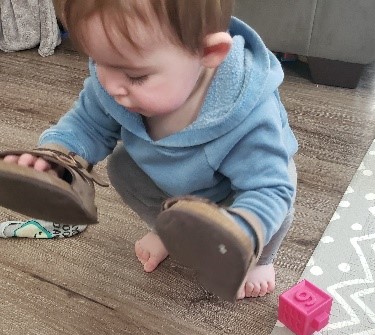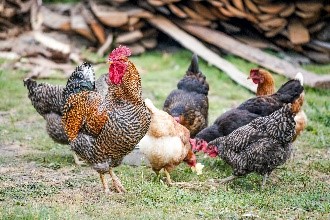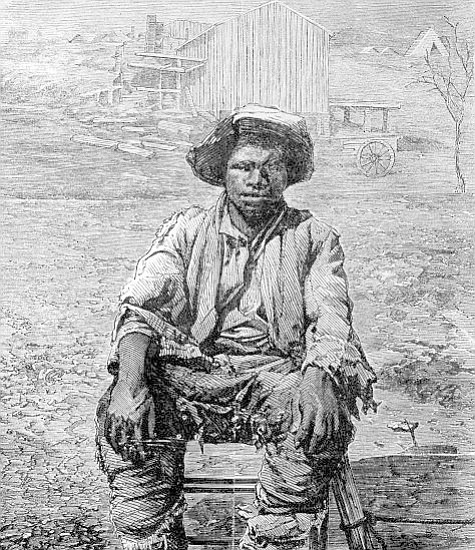Watch on YouTube or Facebook Live
Some things are just out of our control.
I wonder if even just the title of today’s message has you thinking. What sorts of things are out of our control? What comes to mind?

One that I thought of is the behavior of a toddler. There’s no explaining it sometimes. For example, our grandson Emmett likes to walk around with shoes on his hands. He has great fun with this! We can speculate about the reasons, but a toddler doesn’t care about reasons which is why we cannot always predict or control what they will do.
It’s not just toddlers. With people of all ages, we cannot control them, but we can control our response. We see this in our scripture reading for today. Jesus cannot control the Pharisees or Herod or the people in Jerusalem, nor does he try, even though he’d like to. But that doesn’t stop him from continuing his mission to bring God’s love to the world.
We don’t know the tone of voice the Pharisees used in giving Jesus their warning about Herod.
“Run for your life! Herod’s got your number. He’s out to kill you!”
- Was it out of serious concern for Jesus? It might have been. Some of them were his friends.
- Or were they mocking him? Herod just beheaded John the Baptist. You’d better hide before you lose your head, too!
Whatever their tone, Jesus is not changing course. He’s “busy clearing out demons and healing the sick.” His time on earth is nearing its end when he’ll be arrested and crucified. But on the third day he’ll be raised from the dead. That’s the way he’ll be “wrapping things up.” (Luke 13:33)
If anyone has the power to control people, it would be Jesus, but he doesn’t do it. How many of us have read Dale Carnegie’s classic book How to Win Friends and Influence People? It’s great advice, but we can’t always predict, influence, or control how people will respond to us.
I learned this the hard way at a job I had in my twenties. At the jobs I’d had before this, I’d found that I could earn the boss’s favor by consistently showing up on time or early, working hard, and going the extra mile. But at this job, it seemed that the harder I worked, the more the boss was unhappy with me. I tried not to be a clock-watcher, so when a customer was needing help longer, I stayed with them past the end of my shift. But I got in trouble for clocking out late. So then I made sure I was clocking out on time, but then I got in trouble for not getting stock put away that had arrived toward the end of the day. I tried talking to the boss about it, but that didn’t get me anywhere. I finally had to just accept that I was not going to be able to make this boss happy. I couldn’t control her response, no matter how hard I tried. Sometimes that’s just how it is.


In our scripture reading, Jesus seems to accept that he’s not going to be able to make Herod happy, either. He calls Herod a fox, and then later in our reading Jesus compares himself to a hen. What do foxes typically do with hens? (Kill them. Eat them.)[2]
Do you know the most effective way to keep a fox from attacking a hen? Put up a fence.[3] Protect the hen because we cannot change the fox.
Can we change things that are out of our control? The answer is not always so clear. So our response is often to try harder. Maybe if we can do it better, pray harder, work harder…but that doesn’t always work, and sometimes we can’t even control our own response because our bodies get in our way …case in point – panic attacks.
I have often said that even when it seems like there’s nothing we can do, the least we can do is show up. At school, the less you miss the less you miss, right? We reward attendance and give penalties for absence. When I was in middle school, we were going to have a mock trial. I was top of my class and looking forward to having big part in this. But then I got mono and I had to miss two weeks of school. When I got back, the parts had all been given out. I was so disappointed.

Sometimes showing up is beyond our control because of the weather. Growing up in California, I’m not too used to having to be concerned about the weather, so it has taken me a while to learn. When we lived in Galveston, Texas, I was told about an ecumenical women’s group that meets there twice a year. It had taken me months to track down the leader and find out when and where to go, and was excited to be going for my first time. But that morning a storm came ashore with torrential rain and, I discovered as I was driving, lots of flooding. But how bad could it be? And I really wanted to be there. I was following a pick-up truck that seemed to be doing fine, so I kept going, even though I was driving a little sedan, and suddenly found myself in water over the top of my tires. Ugh. Panic. I had to turn around and give up on showing up to that meeting.[4]
Some things are out of our control, but that doesn’t mean there’s nothing we can do, or that our actions and responses are without effect.
In her commentary on this passage, seminary professor Stephanie Buckhanon Crowder says that this passage is an example of Herod’s kingdom versus God’s kingdom. The kingdom of God looks small and insignificant. But in the grand scheme of things, Herod’s kingdom is small, and God’s kingdom goes on forever.[5]

Crowder gives Gabriel Prosser as one example. Gabriel was a slave in Virginia who organized a slave rebellion in the year 1800.
“Prosser and the other revolt leaders were probably influenced by the American Revolution … French and Haitian Revolutions with their [talk] of freedom, equality and brotherhood. In the months prior to the revolt Prosser recruited hundreds of supporters and organized them into military units. … Virginia authorities … estimated that several thousand planned to participate … armed with swords and pikes made from farm tools by slave blacksmiths.
“Prosser planned to initiate the insurrection on the night of August 30, 1800. However, earlier in the day two slaves who wanted to protect their masters betrayed the plot to Virginia authorities.”[6]
A rainstorm and that betrayal got in the way of Prosser’s well-made plans and the rebellion failed, but it helped fuel the growing debate over slavery and liberty and equal rights.[7] And inspired others to continue the fight. Historians still wonder how the course of history might have been changed had Prosser succeeded.
We don’t always get to control what happens, or sometimes even how we respond, but even small steps can make a difference.In today’s scripture, Jesus doesn’t let the warnings about Herod keep him from showing people God’s love. We can get distracted by so many things that don’t matter, or that we can’t change or control, but, as the Paul says in Galatians 5:6,
What matters is faith expressing itself through love. Galatians 5:6
In the book Good Enough, the authors tell about a Carmelite nun who made this her life’s mission.

“Her name is Thérèse, born in 1873 to a middle-class family in France. She lost her mom to breast cancer when she was four years old … As a teenager, she decided she wanted to become a nun and joined [the Carmelites}. She spent her years praying, serving, and writing … Her life, however, was short. Like many women of her generation, Thérèse died young, passing at age twenty-four of tuberculosis. There is nothing particularly extraordinary about her life, except the remarkable way that she decided to respond. When she learned that she would die, she decided that her ordinary life [though short] would be lived with limitless love.
When someone in her community would behave in a way that was ungracious or even petty and mean, Thérèse would double down and respond with even greater love and graciousness. She felt that it freed her.”[8]
St. Therese said, “Love proves itself by deeds, so how am I to show my love? Great deeds are forbidden me. The only way I can prove my love is by scattering flowers, and these flowers are every little sacrifice, every glance and word, and the doing of the least actions for love.”[9]

So much is out of our control, but our responses matter.
[10]On the British TV series called Ghosts, a young couple inherits a rundown old mansion in the English countryside. When they move in, they find that they are not alone. The house is full of ghosts of many of the people who have died there over the centuries. The oldest ghost is a caveman named Robin who died thousands of years before anything else was there. Robin insists that they all participate in a special celebration on the night of a lunar eclipse. As you might imagine, the living couple have their own plans for the night, having invited another couple over for dinner, which happens in the same room where the ghosts usually gather to celebrate the eclipse. The dinner guests get in the way of Robin’s celebration, and Robin is crushed.
Afterwards, one of the other ghosts asks Robin why the moon is so important to him. Robin explains,
“Before you, was moonah. Before house, was moonah. Everything come, everything go… but always there… moonah.”[11] The moon is the only thing that’s been around as long as Robin has.
God made the moon, and someday even the moon will pass away, but God’s love goes on forever. God sent us Jesus to show us that great love.
In our reading today, Jesus laments,
“Jerusalem, Jerusalem, killer of prophets,
abuser of the messengers of God!
How often I’ve longed to gather your children
like a hen with her brood safe under her wings,
but you refused and turned away.”
Psalm 91:4 uses a similar analogy about God.
“He will cover you with his feathers.
He will shelter you with his wings.
His faithful promises are your armor and protection.”
Our best response, no matter what’s happening, is to turn to Jesus.
Jesus is the source of our hope that even small steps can make a difference, and the one who fills us with all the love we have to share.
[1] Chickens by Zosia Korcz on Unsplash. Fox by Yuriy Chemerys on Unsplash.
[2] https://www.rspb.org.uk/birds-and-wildlife/natures-home-magazine/birds-and-wildlife-articles/food-chains/top-of-the-chain/
[3] https://www.predatorguard.com/blog/how-to-protect-chickens-from-foxes
[4] Photo by Wade Austin Ellis on Unsplash
[5] True to Our Native Land: An African American New Testament Commentary, p173.
[6] https://www.blackpast.org/african-american-history/prosser-gabriel-1775-1800/
[7] https://www.washingtonpost.com/archive/lifestyle/2000/02/06/gabriels-rebellion/33c9061a-e33d-4f18-bf02-fe3cd294f5df/
[8] Bowler, Kate; Richie, Jessica. Good Enough (pp. 34-36). The Crown Publishing Group. Kindle Edition.
[9] Bowler, Kate; Richie, Jessica. Good Enough (pp. 35-36). The Crown Publishing Group. Kindle Edition.
[10] Photo by Yu Kato on Unsplash
[11] https://ghosts-bbc.fandom.com/wiki/Robin_The_Caveman
[12] Photo by Michael Anfang on Unsplash


